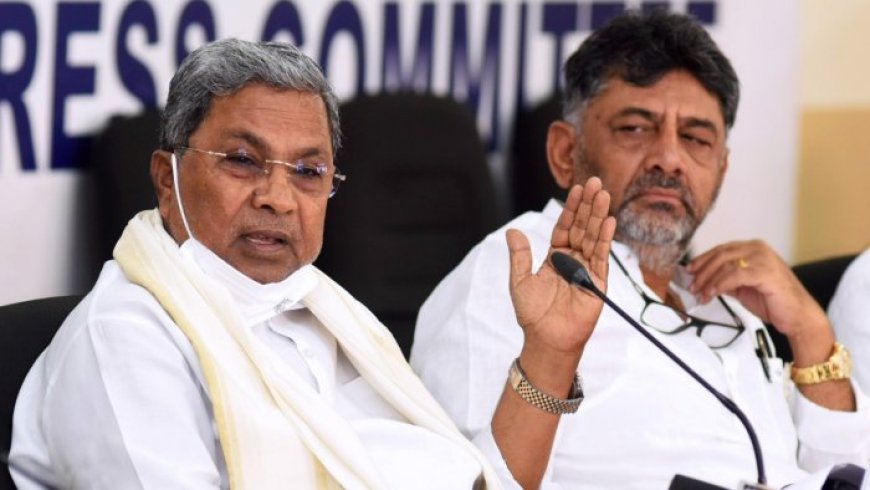Power Struggle in Karnataka: The Growing Rift Between Siddaramaiah and DK Shivakumar
An in-depth look at the political rift between Karnataka Chief Minister Siddaramaiah and Deputy CM DK Shivakumar, its impact on Congress, and the potential implications for 2024 and beyond.

The Congress party in Karnataka, fresh off its resounding victory in the 2023 Assembly elections, is now grappling with a simmering internal crisis. The two most powerful figures in the state — Chief Minister Siddaramaiah and Deputy Chief Minister DK Shivakumar — are caught in a subtle yet intensifying power tussle. While both leaders publicly maintain decorum, political observers and insiders report growing differences in leadership style, administrative decisions, and succession planning.
This political rivalry could have far-reaching implications, not just for the governance of Karnataka but also for the Congress party’s strategy heading into the 2024 general elections and beyond.
Genesis of the Rift
The Congress’s landslide victory in the 2023 Karnataka Assembly elections was seen largely as a combined effort. Yet, the post-election negotiations exposed deep cracks. Siddaramaiah, a seasoned leader and former CM, was eventually reinstated as Chief Minister. DK Shivakumar, the Karnataka Pradesh Congress Committee (KPCC) president and a key architect of the party’s grassroots mobilisation, was appointed Deputy Chief Minister.
Many believed this arrangement was a temporary compromise, with an unwritten “rotational CM” formula reportedly in place — though this has never been officially confirmed. Now, with Siddaramaiah nearing one year in office, pressure is building from Shivakumar’s supporters to honour the alleged agreement.
Political analyst Prof. Sandeep Shastri noted, “When two top leaders pull in different directions, the party’s ability to govern cohesively gets compromised. Karnataka could become a textbook example if not handled delicately.”
Differences in Style and Strategy
Siddaramaiah has carved a niche as a mass leader with strong socialist leanings and a pro-poor governance model. His policies such as Anna Bhagya and Gruha Lakshmi have earned widespread approval. On the other hand, DK Shivakumar is a shrewd organiser and political strategist with a stronghold in the Vokkaliga community, particularly in the Old Mysuru region.
Sources within the Congress party say their decision-making processes often clash. Shivakumar reportedly feels sidelined in major administrative decisions, while Siddaramaiah’s camp views DK Shivakumar as being overly aggressive and ambitious.
In The Hindu's political coverage, insiders hint at a growing factional divide within the Congress legislative party, with some MLAs aligning closely with either camp. These internal rivalries are also beginning to impact the pace and coherence of government policy implementation.
Stakes for the Congress High Command
The Congress high command, particularly party president Mallikarjun Kharge and Rahul Gandhi, now faces the daunting task of managing this delicate balance. Any mishandling could alienate key voter blocs or even lead to a full-blown split in leadership.
In a recent interview with NDTV, a senior Congress leader anonymously remarked, “We are walking on eggshells. If things escalate, it could be a repeat of the Punjab or Rajasthan episodes.”
The Congress party is also wary of losing momentum in Karnataka — one of the few large states where it has consolidated power — ahead of the 2024 Lok Sabha elections. Internal dissent could provide the Bharatiya Janata Party (BJP) a fresh narrative to question the Congress's unity and governance capabilities.
Public Posturing and Silent Manoeuvring
Despite the undercurrents of conflict, both leaders have maintained a veneer of unity in public. However, political developments tell a different story. Siddaramaiah’s recent bureaucratic reshuffles and Shivakumar’s parallel tours of key districts have sparked speculation about competing power centers.
A report by The News Minute highlighted how Shivakumar’s increasing outreach efforts and public statements indicate an effort to build a statewide persona, perhaps in preparation for a leadership transition.
Meanwhile, Siddaramaiah’s loyalists argue that the current CM must be allowed to complete his full term for stability. They warn that any premature transition could lead to administrative paralysis.
Implications for Karnataka’s Governance
The leadership rift has begun to impact policy consistency, especially in sectors like infrastructure development, education reform, and rural welfare schemes. Several stalled projects and bureaucratic bottlenecks are being blamed on a lack of synchronisation between the CM and Deputy CM offices.
This leadership duel may also derail crucial coalition-building efforts ahead of the 2024 general elections. Karnataka sends 28 MPs to the Lok Sabha, and the Congress is eyeing at least 20 seats to bolster its national tally. A fractured state leadership could significantly hurt those ambitions.
Looking Ahead: Possible Scenarios
1. A Peace Deal Brokered by Delhi
The high command could enforce a time-sharing agreement or publicly clarify the leadership roadmap to defuse tensions. This would require both leaders to compromise — a tall order, but not impossible.
2. One Leader Outmaneuvers the Other
If no resolution is reached, one leader may eventually assert dominance. In such a case, DK Shivakumar could either be promoted or choose to chart an independent path, potentially shaking Karnataka’s political landscape.
3. An Implosion
The worst-case scenario — open rebellion or resignation — could lead to a loss of public trust, giving the BJP and JD(S) room to recover lost ground.
Conclusion
The Congress leadership in Karnataka is at a crossroads. The personal ambitions of Siddaramaiah and DK Shivakumar, if left unchecked, could derail the party’s momentum and governance goals. For the sake of stability and progress, the Congress must find a path forward that honours contributions from both leaders without compromising administrative efficiency.
As 2024 looms large, the Karnataka Congress cannot afford to appear divided. The coming months will be critical in determining not just who leads Karnataka, but also the broader trajectory of the Congress party in India’s changing political climate.


















































